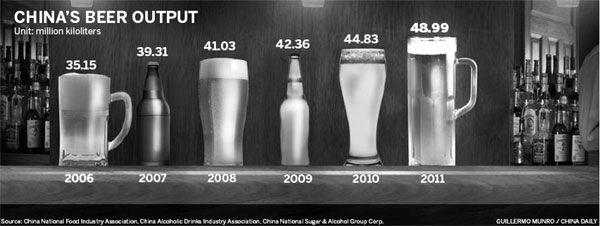 |
|
|
|
|||||||||||
Fashion trend
Along with a spike in consumption, there has also been a marked change in the customers' perceptions, Maher said.
With disposable income on the rise, beer has slowly made inroads in the high-end sector, traditionally dominated by wine and spirits.
Drinking premium beer is now fashionable among affluent, middle-income families as well as younger generations, Maher said.
"There is high profitability in the premium beer segment," he said. "Premium beer will account for 25 percent of China's annual beer capacity over the next five to 10 years. This is good for us, as we have always been strong in the premium segment.
"As consumers move up, they're moving into our playground," he added.
"From the Chinese perspective, what we are trying to do is to say that beer has a role to play in Chinese celebrations."
Carlsberg has already had more than 20 brands targeting Chinese drinkers, although Maher conceded that companies need to get ahead of the trend if they want to make it big in the Middle Kingdom.
"The market has become more demanding, and the fast-changing landscape means that the one with the ear closest to customer preference clearly walks away with the crown," he added.
Finding partners
After dominating the premium beer sector in China, foreign brewers are turning their attention to low-end customers through acquisitions.
Beijing Yanjing Brewery Co Ltd, the only Chinese brewery without an overseas partner, has looked on as Western rivals have teamed up with companies in second- and third-tier cities.
Based in the capital, and with 42 branches in 18 cities, Yanjing is already one of top-three beer producers in China, and it aims to be one of the world's top-six brewers by 2015.
To achieve the goal, the company needs to add 3 million kiloliters to boost its annual output to 8 million kiloliters.
Huang Fusheng, an analyst at China Securities, said that over the next five years the competition in the country's beer market is expected to become more intense, as the brewers will seize opportunities in mergers and acquisitions.

|
Carlsberg beer products in a supermarket in Chongqing, Southwest China. The Danish brewer benefits a great deal from its partnership with Chinese brands. Now, Carlsberg owns more than 30 breweries in 11 provinces and autonomous regions. [Photo/China Daily] |